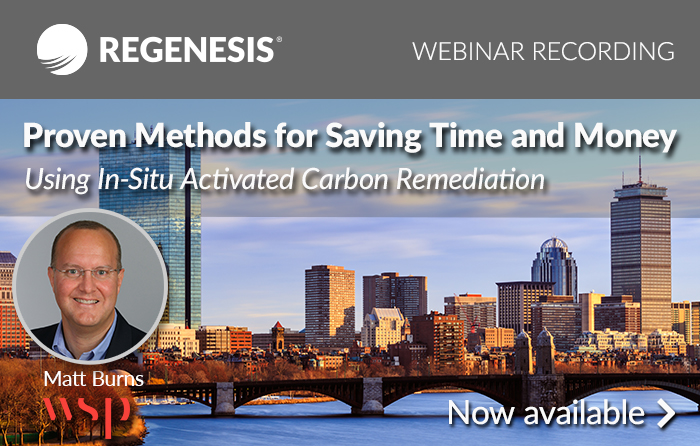The old adage ‘Time is Money’ has never been more relevant than it is today in the dynamic brownfield market. What if you could augment cost justification by evaluating mass removal data? Understanding mass removal at in situ activated carbon remediation sites is essential for evaluating open-ended treatment scenarios, such as passive barrier configurations; however, it can be difficult to discern mass removal from sorption. This webinar presentation takes the concept of saving both time and money in its real-world evaluation of in situ remediation using micron-scale activated carbon on a variety of sites. Practical techniques for assessing complete degradation where PlumeStop® activated carbon has been applied will be discussed and net trends of sorption versus treatment will be assessed at sites with a comparison to pump and treat scenarios.
This webinar features:
- Understanding mass removal at in situ activated carbon remediation sites in order to evaluate open-ended treatment scenarios, such as passive barrier configurations
- Practical techniques for assessing complete degradation at PlumeStop activated carbon applied sites
- Assessment of net trends of sorption versus treatment will be assessed at several sites with a comparison to pump and treat scenarios
In this webinar we are pleased to have as a special guest speaker Matt Burns, Technical Director of Environmental Services for WSP. His presentation discussed proven methods for saving time and money using in situ activated carbon remediation. He was joined by Maureen Dooley, Director of Strategic Projects at REGENESIS.
About the Presenters:
 Matt Burns
Technical Director of Environmental Services, WSP
Matt is a Technical Fellow and the U.S. Contaminated Land National Service Line Director for WSP with more than 25 years of professional chemistry and engineering experience. He is based Boston, Massachusetts and is responsible for the financial and technical depth and breadth of the contaminated land (site investigation and remediation) service line. Matt also brings chemical and microbial process expertise to assist local WSP teams with challenging investigation and remediation projects in the U.S. and across the globe. His area of expertise includes practical application of microbial and chemistry-based innovative remediation. He has authored numerous publications and conference platform presentations and is a frequent lecturer at continuing education workshops and webinars. Recently, he has been publishing and lecturing as part of the U.S. Environmental Protection Agency (EPA), National Groundwater Association (NGWA) and Northeast Waste Management Officials Association (NEWMOA) combined remedy initiative. Matt’s expertise in this area relates to stimulating multiple in situ degradation pathways with a single amendment application to more efficiently and cost effectively treat volatile organic compound-affected groundwater. Matt is on science advisory boards for non-profit educational and commercial entities. He is also on the editorial review board for the journal Remediation Journal. He holds a Bachelor of Science degree in Environmental Science from the University of Massachusetts at Amherst and a Master of Science degree in Civil/Environmental Engineering from the University of Maryland at College Park.
Matt Burns
Technical Director of Environmental Services, WSP
Matt is a Technical Fellow and the U.S. Contaminated Land National Service Line Director for WSP with more than 25 years of professional chemistry and engineering experience. He is based Boston, Massachusetts and is responsible for the financial and technical depth and breadth of the contaminated land (site investigation and remediation) service line. Matt also brings chemical and microbial process expertise to assist local WSP teams with challenging investigation and remediation projects in the U.S. and across the globe. His area of expertise includes practical application of microbial and chemistry-based innovative remediation. He has authored numerous publications and conference platform presentations and is a frequent lecturer at continuing education workshops and webinars. Recently, he has been publishing and lecturing as part of the U.S. Environmental Protection Agency (EPA), National Groundwater Association (NGWA) and Northeast Waste Management Officials Association (NEWMOA) combined remedy initiative. Matt’s expertise in this area relates to stimulating multiple in situ degradation pathways with a single amendment application to more efficiently and cost effectively treat volatile organic compound-affected groundwater. Matt is on science advisory boards for non-profit educational and commercial entities. He is also on the editorial review board for the journal Remediation Journal. He holds a Bachelor of Science degree in Environmental Science from the University of Massachusetts at Amherst and a Master of Science degree in Civil/Environmental Engineering from the University of Maryland at College Park.
 Maureen Dooley
Director of Strategic Projects, REGENESIS
Maureen Dooley has over twenty five years experience in the environmental industry including project management, research and development, senior technical oversight, remedial design and laboratory management. Ms. Dooley’s current position is the Director of Strategic Projects for REGENESIS. In her current role at REGENESIS, she provides technical leadership for complex soil and groundwater remediation projects throughout North America, as well as remediation design, strategy, and business development in the northeastern United States and eastern Canada. As part of her responsibilities at REGENESIS she has reviewed hundreds of potential projects and provided recommendations for remediation. In addition, she has completed numerous treatability studies designed to evaluate the remediation of a wide range of contaminants, including chlorinated solvents, petroleum hydrocarbons, and emerging contaminants like PFAS.
Maureen Dooley
Director of Strategic Projects, REGENESIS
Maureen Dooley has over twenty five years experience in the environmental industry including project management, research and development, senior technical oversight, remedial design and laboratory management. Ms. Dooley’s current position is the Director of Strategic Projects for REGENESIS. In her current role at REGENESIS, she provides technical leadership for complex soil and groundwater remediation projects throughout North America, as well as remediation design, strategy, and business development in the northeastern United States and eastern Canada. As part of her responsibilities at REGENESIS she has reviewed hundreds of potential projects and provided recommendations for remediation. In addition, she has completed numerous treatability studies designed to evaluate the remediation of a wide range of contaminants, including chlorinated solvents, petroleum hydrocarbons, and emerging contaminants like PFAS.

